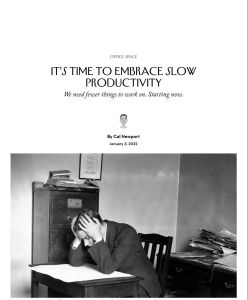Join getAbstract to access the summary!

Join getAbstract to access the summary!
Cal Newport
It's Time to Embrace Slow Productivity
The New Yorker, 2023
What's inside?
As workers grow more fed up with the status quo, it’s time to start tackling the root causes of burnout in the workplace.
Recommendation
America’s worship of hustle culture may be coming to an end. US workers are experiencing record levels of stress and burnout, reports Cal Newport, and they’re ready for a change. Some advocate for a shift to a 32-hour workweek. But will a shorter workweek really help when knowledge workers’ task loads no longer align with a traditional nine-to-five work day? This compelling argument to focus, instead, on a reduction in work volume will appeal to employees and managers wondering how the workplace of the future can successfully address burnout.
Summary
About the Author
Cal Newport is Provost's Distinguished Associate professor of computer science at Georgetown University. He has written numerous books including: Deep Work: Rules for Focused Success in a Distracted World and So Good They Can't Ignore You: Why Skills Trump Passion in the Quest for Work You Love. He also wrote the New York Times bestseller Digital Minimalism: Choosing a Focused Life in a Noisy World.


















Comment on this summary